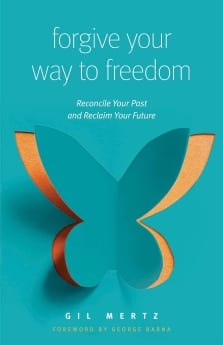Forgive Your Way to Freedom
Reconcile Your Past and Reclaim Your Future
(Moody, 2018)
WHO: Gil Mertz, who has been involved in ministry for more than 40 years.
HE SAYS: “We don’t need more faith to forgive; we need to use the faith we already have. In the same way, we don’t need more of God’s power to forgive; we need to unleash to the power he has already given us.”
THE BIG IDEA: This guide to forgiveness takes readers through all the steps to let go of past pain and rediscover purpose and hope.
THE PROGRESSION:
This book begins with “Understand Forgiveness,” a section that deals with myths of forgiveness, the power of forgiveness and the best way to forgive.
Part 2, “Look Back to Move Forward,” helps readers understand the damage unforgiveness can do and what happens when we share our pain with God.
Part 3, “Let Go and Let God,” shows the importance of not keeping a victim mentality. Part 4, “The Future Is Yours,” talks about restoring relationships, forgiving yourself and making peace with God.
“If we want to imitate God, we need to embrace forgiveness. And if we want to please God, we need to practice it.”
Order this book from Amazon.com »
Read an excerpt from this book »
A CONVERSATION WITH GIL MERTZ
How can pastors use this book to help their congregants move toward forgiveness?
Everyone in your church knows they’re supposed to forgive, but few know how because it is rarely taught. And yet, forgiveness impacts every life, every relationship, every marriage, every family, and every church member. As a former pastor, I purposely designed the book to be easily adapted and taught by church leaders. It is divided into four sections that could provide four weeks of teaching notes for a one-month series on forgiveness. It could be used for a half-day seminar or as a four-part weekend retreat. It also has 12 chapters that could be used for a home group study or Sunday School class for one quarter.
The book is biblical, clinical and highly practical. It can help your congregants experience the joy, power and freedom through forgiveness. It can help transform empty lives, restore broken relationships, reconcile hopeless marriages, heal hurting families and bring genuine revival to your church.
What is a common misconception that people have about forgiveness?
That you must forget to forgive, which is absolutely not true. People often get stuck in the forgiveness process by thinking they can overcome the memories of their painful past through sheer willpower or by praying that God will press some magical delete button in their brains. This futile effort of trying to forget the past not only spills over into our peace in the present but threatens to sabotage our purpose for the future. We need to stop trying to forget which only leads to frustration and defeat and start learning how to remember in a different way. Romans 12:2 describes it as the “renewing of our minds” or changing the way we think. We cannot change the past, but we can recall it in a way that offers peace and hope instead of unresolved pain. We can’t forget our hurtful memories, but we can learn to manage their frequency and intensity, so we can control our emotions instead of being overwhelmed by them. Being unable to forget doesn’t mean you haven’t forgiven, but it also doesn’t mean you have to languish in your thoughts of the past. You can forgive your way to freedom and move on with your life.
In this “age of rage,” it seems hard for people to forgive. What advice would you offer them?
It was hard for God to forgive us because it cost our heavenly Father his son who died for our sins. Forgiveness is hard because it goes against every natural instinct we have when we’re hurt, but it is when we forgive that we are most like God.
Unforgiveness is also the easiest sin to rationalize because we feel that we’re justified to withhold it when we’ve been wronged which makes it so dangerous to our spiritual, emotional, mental and physical health. If you’re struggling in this age of rage, the antidote is forgiveness. You can replace the anger, bitterness and resentment with peace, joy and freedom.
The first step is to show God where it hurts. Psalm 147:3-4 says, “He heals the brokenhearted and binds up their wounds. He determines the number of stars and calls them each by name.” If God knows the names of 300-sextillion stars, he knows every detail about your life and cares. And then commit to God that you will choose to forgive. It will be a process, but he will walk with you every step of that journey. And remember, no one benefits more than us when we forgive, and no one suffers more than us when we don’t. When you choose to forgive, you can resolve your pain of the past, restore your peace in the present, and reclaim your purpose for the future. Once you’re free, there’s nothing you can’t do.

